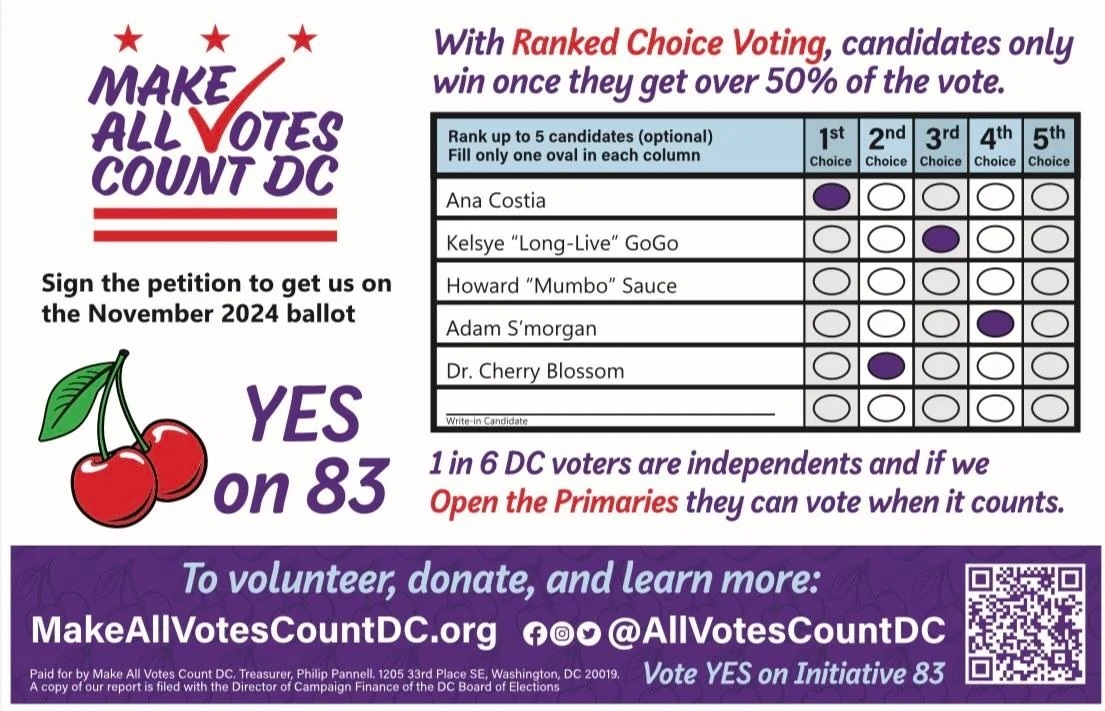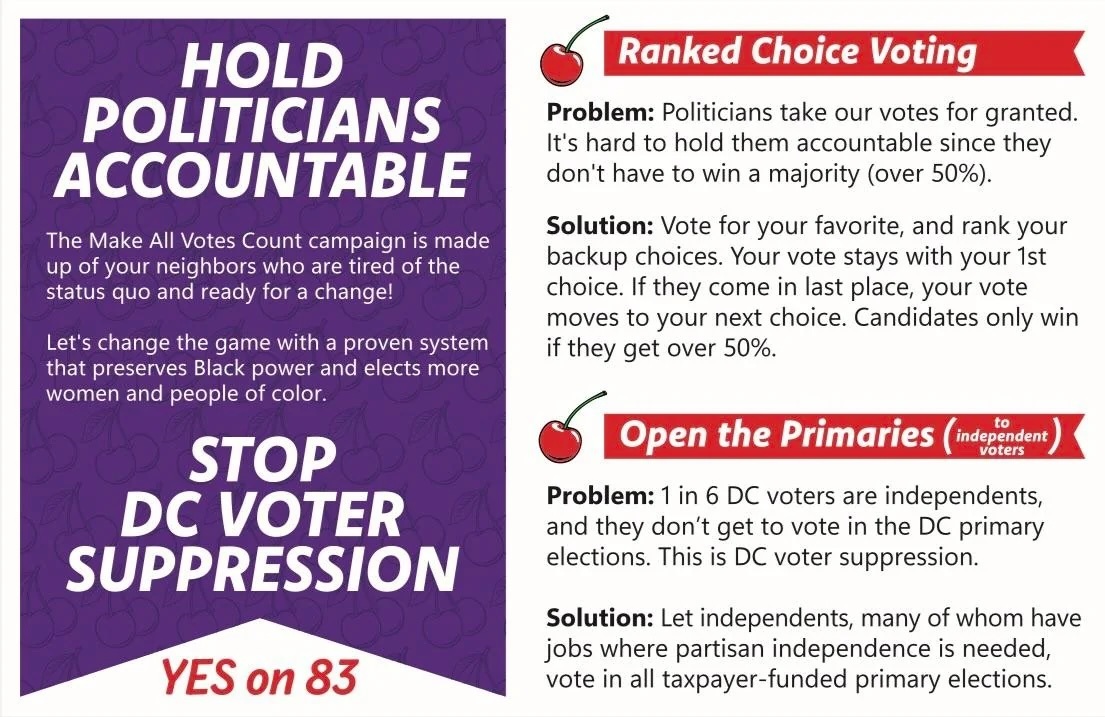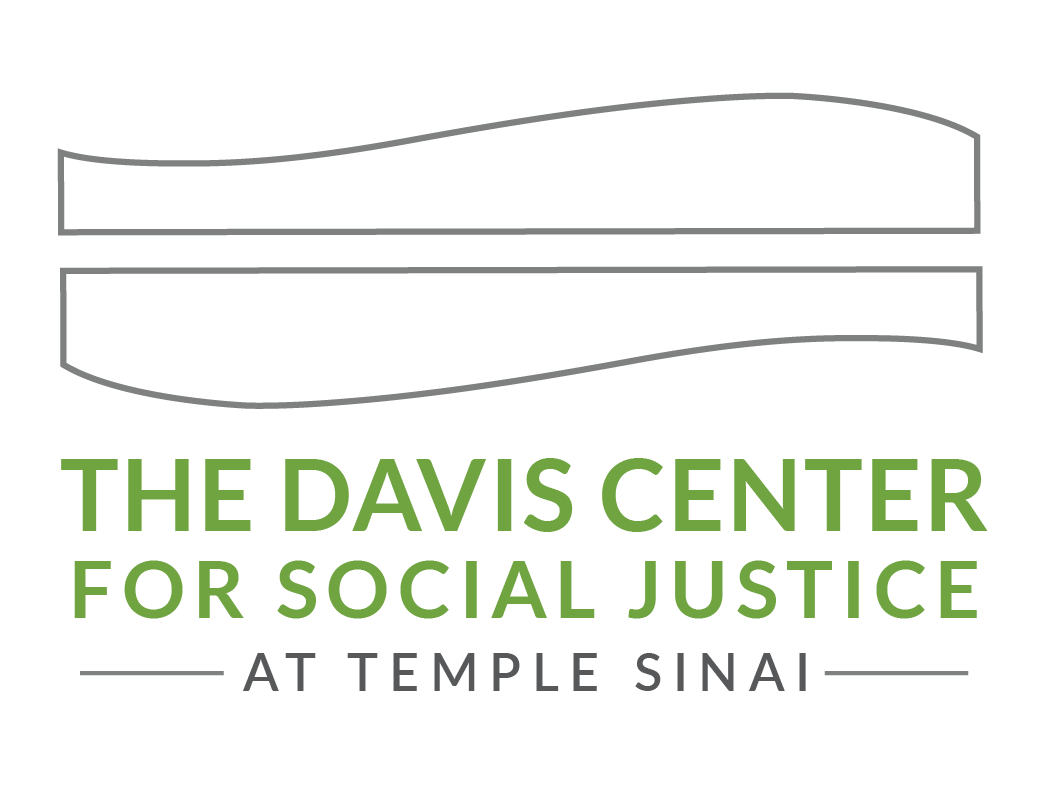by Nat Cohen
One of the pillars of Temple Sinai’s social justice work is strengthening our democracy. The Get Out the Vote initiative of the Davis Center for Social Justice focuses on empowering voters of color and combatting voter suppression, particularly in the South. DC Ballot Initiative 83 is an effort with similar goals here in our own community.
What is Initiative 83?
DC Ballot Initiative 83 is an opportunity for District of Columbia voters to improve the way DC conducts our elections. Initiative 83 calls for adopting two separate electoral reforms. One reform is to use Ranked Choice Voting (RCV) for multi-candidate elections. The other reform is to enable independent voters to vote in the party primary election of their choosing.
Why Does it Matter?
Action on many of the pressing issues facing us today — including gun violence, climate change, income inequality, immigration reform, and reproductive rights — requires developing consensus solutions with enough political support that they can be enacted as legislation. Yet the way we elect our representatives, using closed primaries and plurality voting, serves to increase polarization and makes consensus-building more difficult. The key to unlocking solutions to the major problems we face may be to reform the way we conduct our elections.
Why Support Ranked Choice Voting?
A serious defect in our current election method, known as plurality voting or “First Past the Post,” is that because a candidate can win with less than majority support, the winner may be hostile to the interests of the majority – which is the opposite of what an election is supposed to accomplish.
An illustration of this dynamic, though not a perfect example, is the recent California Senate primary election. Adam Schiff, Katie Porter, and Barbara Lee split the Democratic vote while Steve Garvey, a Republican, nearly won a plurality of all the votes cast, despite presumably not being a favorite of the majority of California voters, where Democrats hold a 2-to-1 advantage in voter registration. That representatives can be elected who are disapproved of by most of their constituents reduces confidence in our democratic process and discourages voter participation.
In DC primary elections, candidates often win with less than a majority of the vote. In the 2020 DC Council At-Large general election, a councilmember was elected with less than 15% of the vote. While these candidates may have been supported by most of their constituents, we are left in the dark, because, unlike RCV, plurality voting often does not give us enough information to determine which candidates have majority support.
Ranked Choice Voting is being adopted by an ever-increasing number of jurisdictions, including Maine and Alaska. RCV is championed by the nonprofit group, FairVote, based in Silver Spring. FairVote cites RCV’s many benefits, which include (1) reducing the likelihood of unrepresentative outcomes; and (2) eliminating the spoiler effect, where voting for a minor-party candidate may have the unfortunate effect of helping to elect a candidate with diametrically opposed views. Where RCV has been adopted, it has served to discourage negative campaigning, to encourage building coalitions to reach the majority support threshold, and to lower barriers for candidates who may be outside of the traditional power structures, such as women and people of color.
Why Support Opening the Primaries?
Washington, DC, with its large population of journalists, academics, and nonpartisan nonprofits, has many residents who do not wish to publicly identify with a political party for either professional reasons or reasons of conscience. Nearly one in six DC registered voters has not expressed a party preference. Unlike DC, most states (red, blue, and purple) have opened up their primaries to independent voters.
Since DC “is overwhelmingly blue, the Democratic primary has become the de facto election”. Yet independents cannot participate. As anyone can register as a Democrat regardless of their views, there is no good purpose served in excluding independent voters from participating in Democratic primary elections (which they help pay for as taxpayers) thereby denying them a meaningful say in choosing their representatives.
For those who wish to learn more about the arguments in favor of open primaries, this NYTimes Op-Ed by Chuck Schumer and this Morning Joe interview with Nick Troiano, the Executive Director of Unite America, are good places to start.
An Opportunity: How You Can Help
DC voters have an opportunity to take our place at the vanguard of election reform by supporting Initiative 83. We can do this by adding our signatures to the ballot petition drive, by helping to gather signatures (the campaign’s goal is to collect 30,000 signatures by the end of June), by educating our friends and neighbors about Initiative 83, and by voting in favor of Initiative 83 in the voting booth in the November general election. As our nation’s capital, DC’s adoption of these reforms will not only be beneficial in our own elections but will highlight them nationally.
Nat Cohen is a long-time member of the Temple Sinai congregation These are his personal views. While he is a grassroots supporter of the Initiative, he is not writing as a representative of Make All Votes Count DC, the organization that is sponsoring work on Initiative 83.


